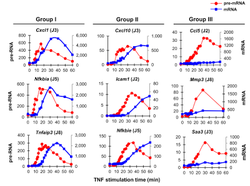
Hao and Baltimore (2013). RNA splicing regulates the temporal order of TNF-induced gene expression. PNAS.
The main idea: In many inducible systems the mRNA of different genes being induced appears sequentially. This may be either due delayed access of transcription factors at the genes to appear later but one cannot exclude the possibility for all genes' pre-mRNA being readily produced followed by a subsequent delay in maturation due to splicing. The authors test the latter hypothesis in the context of TNF-induced B-cells.
The data used: Immortalized mouse embryonic fibroblasts treated with TNF and analyzed at the levels of gene expression, transcript stability and splicing speed.
The analysis: The authors have previously defined that upon TNF induction, different sets of genes appear to be upregulated in three distinct "waves". An immediate (within 30 minutes of induction), an intermediate (2h after induction) and a late one (12h or more after induction). In this work they measure primary and mature mRNA levels to show that although the primary (unspliced) mRNA levels appear comparable for genes of all three groups, mature (spliced) mRNA levels seem to follow a certain trend that is related to the gene groups. Thus they argue that the 3 "waves" of induction are regulated at the level of mRNA splicing.
What's next: It remains to be seen whether this splicing-regulated time dependence may be reflected in specific properties of the underlying sequence. It would be interesting to see whether splicing may be guided by other measurable properties of the genes' sequences.
Read more: A previous work of the same team that first proposed the "3 waves" of TNF-inducible genes. Hao and Baltimore (2009). The stability of mRNA influences the temporal order of the induction of genes encoding inflammatory molecules. Nature Immunology 10, (13), 281-288.
 RSS Feed
RSS Feed
